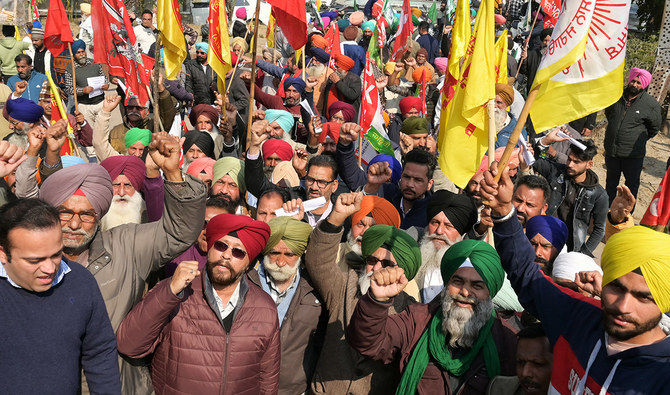NEW DELHI: Indian police on Tuesday used tear gas and detained some farmers who clashed with them and tried to break barricades blocking their way to New Delhi to demand guaranteed crop prices in a repeat of 2021 protests, when they camped on the capital’s outskirts for more than a year.
Police dropped tear gas canisters on the protesting farmers from a drone at one of the border points in northern Haryana state that leads to New Delhi, where tens of thousands of farmers are headed on tractors and trucks.
Police have sealed multiple entry points into the capital with barriers of giant metal containers, barbed wire, spikes and cement blocks.
The government has banned large gatherings in the capital and suspended Internet service in some districts of neighboring Haryana state to prevent communication among the protesters.
The demonstration comes more than two years after Prime Minister Narendra Modi withdrew controversial agriculture laws that had triggered the earlier protests, in which tens of thousands of farmers camped outside the capital through a harsh winter and a devastating COVID-19 surge.
The farmers, who began their march in northern Haryana and Punjab states, are asking for legislation that will guarantee a minimum support price for all farm produce.
The government protects agricultural producers against any sharp fall in farm prices by announcing a minimum purchase price for certain essential crops at the beginning of the sowing season, taking into account the cost of production.
Farmers are also pressing the government to meet its promise to double their income and waive their loans. They say they will protest in New Delhi until their demands are met.
The withdrawal of the agricultural laws in November 2021 was seen as a major retreat by the Modi government, which was shocked in January that year when tens of thousands of farmers stormed the historic Red Fort in New Delhi.
After withdrawing the laws, the government said it would set up a panel of farmers and government officials to find ways to ensure support prices for all farm produce. Multiple meetings since then have made no progress.
“We do not want to break any barricades. We want a resolution of our issues through dialogue. But if they (the government) do nothing, then what will we do? It is our compulsion,” Sarwan Singh Pandher, a leader of one of the farmer groups, told reporters Tuesday.
Pandher said talks between farm leaders and government ministers on Monday failed to produce any consensus on their key demands and the government refused to make a decision.
The current march called “Delhi Chalo,” or “March to Delhi,” comes just months before a national election in which Modi is widely expected to win a third term.
The protests could pose a significant challenge for Modi and his governing Bharatiya Janata Party as farmers form the most influential voting bloc in India and politicians have long considered it unwise to alienate them.
The stakes are high in Haryana and Punjab, where farmers form a sizable population, as the two states send 23 lawmakers to India’s lower house of Parliament.
India’s opposition Congress party said it will address the farmers’ demand for a law ensuring a minimum support price if it is voted into power in the upcoming national election.
“This is the first guarantee of Congress on the path of justice,” party leader Rahul Gandhi wrote on X.
Some farmer and trade unions have also announced a countrywide rural strike on Friday.























